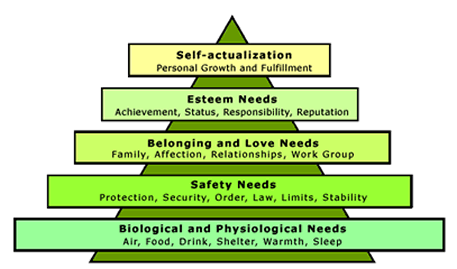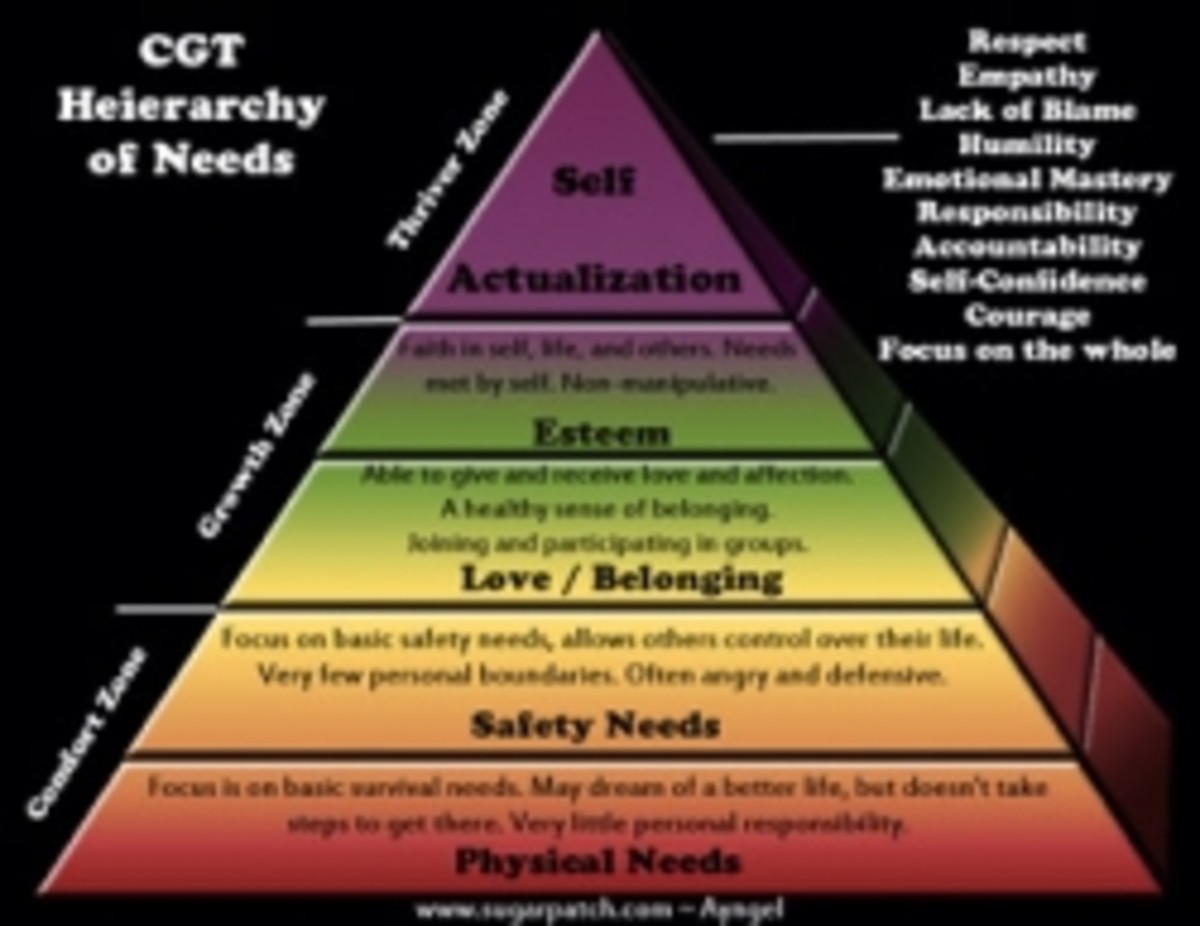- HubPages»
- Health»
- Quality of Life & Wellness»
- Personal Development
Motivations and Personality
We Are Who We Are

Different Parts of Our Personality
Personality is complex. There are different parts of a person’s personality.
-
traits
-
mental mechanisms
-
mental models
-
agencies
Psychologists who study personalities may compare the different parts of personality to each other. It is important to understand the different parts of a personality.
Mental mechanisms have to do with our working memory, specific emotions, facial expressions, and urges.
Motives are related to how we behave. They steer us in a direction that make us do the things we do. Our motives impact the choices we make. What we place our values on motives us to behave differently. Motives help direct our behavior. Motives are also referred to as instincts.
It can be difficult to measure motives because people may not be conscious of their own motives.
Needs, Motives, and Personality

Motivations and Personality
There are many reasons that motivate people to do certain things. Motives have different origins in the brain and appeal to different personal aspirations.
Our emotions guide our motives and our actions and our relationships with others. We have many different emotions. People have different kinds of emotions and different ranges within these emotion. Some people are happier than others. Some worry more than others.
Within these emotions there are different characteristics that are demonstrative of these feelings.
Motivations are also part of personality. Each of us has different motivations, some are motivated by needs, and some are motivated by desires we have acquired from our environment.
Our needs are usually are derived from basic biological survival of hunger, thirst, shelter, sexual, and security. Abraham Maslow was a famous psychologist who developed the pyramid of needs. Our personalities will be affected by how much of our needs are met.
Needs We Have
Henry Murray, an American psychologist developed his theory of personality based on motives, the environment, and our needs. He believed our personality is greatly influenced by our needs and our behaviors on a mostly unconscious level. He divided needs into two parts:
-
primary needs - basic biological needs
-
secondary needs - psychological needs such as nurturing, achievement, independence
He listed 24 needs, divided into four categories, that all people have, just at various levels.
1. Ambition Needs
-
Achievement: the need to succeed and accomplish
-
Exhibition: shocking others.
-
Recognition: gaining social status through acknowledgment of achievements.
2. Materialistic Needs
-
Acquisition: acquiring things
-
Construction: making and creating things.
-
Order: the need to be organized
-
Retention: holding onto things
3. Power Needs
-
Abasement: apologizing.
-
Autonomy: independence
-
Aggression: attacking
-
Blame Avoidance: avoiding blame and following rules
-
Deference: cooperating with others and obedience.
-
Dominance: Control over others.
4. Affection Needs
-
Affiliation: time with other people.
-
Nurturance: Taking care of others
-
Play: Having fun
-
Rejection: excluding others
-
Succorance: Being helped or protected by others.
5. Information Needs
-
Cognizance: asking questions, learning and gaining knowledge
-
Exposition: Teaching others
Murray believed needs can be interrelated and the environment plays a role in a person’s behavior. Motives work in different ways but do play a role in the personality of an individual.
Personalities
The Need to Achieve or Avoid Failure
People also hide their motives from others and this can affect their personality and behavior.
Some people are naturally driven to achieve. They take on challenges and push themselves to excel, where others do not have this internal mindset.
Experts in the field of personality believe there are two personality types:
-
the need to achieve
-
the need to avoid failure
People who have the need to achieve are usually very determined people, who thrive on challenges, are willing to take risks, and are not afraid of being judged. They will commit themselves to pursue their aim, even if it takes a long time to accomplish.
People who need to avoid failure usually avoid responsibility, afraid of constructive criticism, avoid challenges and risks, are slow at what they do, and can easily be convinced not to take part in something.
Some of these people are ego oriented where they view their own success by putting others down.
Some people are task oriented where they view their own success by what they have achieved.
People who are high achievers share several personality traits:
-
they look to learn, improve, and gain ever higher standards of excellence
-
they set challenges for themselves and avoid things that are too easy to avoid boredom
-
they are realistic in what they know they can accomplish and will avoid tasks that are overly difficult so that they can’t be accomplished
-
they persevere and are persistent
-
they are future oriented
-
they won’t give up even if they are temporarily frustrated
Personality and Careers

Our Motivations, Our Career Choices, and Our Personalities
People who are motivated by power look to control others. They often have a dictatorial style and are highly motivated by this desire. People who are motivated by power tend to find careers where they can have influence over other people. They may seek to be business executives and managers, in the mental health field, teachers, writers, and clergy members, lawyers, doctors and scientists. People in high power positions are not always well liked or viewed as hard workers or problem solvers. Some people are motivated by being controlling because they are compensating for themselves having been controlled in their childhood.
We are also motivated by the need to be affiliated with other people. By nature we are social creatures. We seek love and companionship and acceptance, sympathy and understanding. They seek positive emotional relationships and they want to spend more time with people. Characteristics of people who are motivated by affiliation include being more sympathetic, empathetic and accommodating towards other people. They generally find careers that are people oriented, and seek to have peace, rather than conflict in their world.
Some people are motivated by their sex drive. This may affect a person’s focus on their own and other’s physical attractiveness, fitness, exercise, and eating habits, grooming, choice of clothing, and hairstyles.
When people strive for things they can achieve and are motivated by realistic standards they set for themselves, they will elicit a feeling of well being towards others, which is reflected in their personality, interaction with others, thoughts, and behaviors. They will generate positive feelings for themselves, and their connections with others will tend to be more positive and upbeat too.









